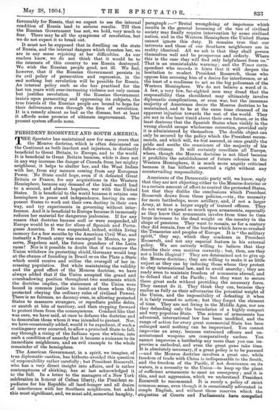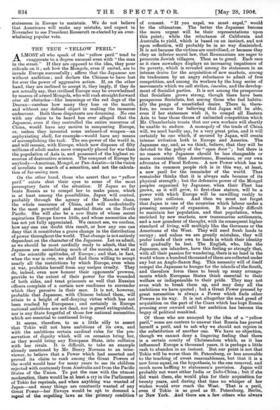PRESIDENT ROOSEVELT AND SOU AMERICA. T HE Spectator has maintained now
for many years that the Monroe doctrine, which is often denounced on the Continent as both insolent and injurious, is distinctly beneficial to Great Britain, to Europe, and to the world. It is beneficial to Great Britain because, while it does not in any way increase the danger of Canada from her mighty neighbour, it helps to shelter her, and the West Indies with her, from any menace coming from any European Power. No State could hope, even if it defeated Great Britain or France, for any acquisitions in the Western Hemisphere, because any demand of the kind would lead to a second, and almost hopeless, war with the United States. It is beneficial to the world because it retains one hemisphere in peace and independence, leaving its com- ponent States to work out their own destiny in their own way, and try experiments in governing without inter- ference. And it is beneficial to Europe because it immensely reduces her material for dangerous jealousies. If for any reason that doctrine became null or were suspended, all Europe would be at war for slices of Spanish and Portu- guese America. It was suspended, indeed, within living memory for a few months by the American Civil War, and instantly a French army was encamped in Mexico, to pre- serve, Napoleon said, the future grandeur of the Latin races ! Nor is it possible to doubt that if to-morrow the Union withdrew its protecting shield, Germany would leap at the chance of founding in Brazil or on the Plate a State which could receive and utilise the overspill of her in- creasing population. But while maintaining the validity and the good effect of the Monroe doctrine, we have always added that if the Union accepted the. grand and overshadowing position throughout two continents which the doctrine implies, the statesmen of the Union were bound in common justice to insist on those whom they protected obeying the ordinary rules of civilised Powers. There is no fairness, no decency even, in allowing protected States to massacre strangers, or repudiate public debts, or snatch at bits of territory, and then stepping forward to protect them from the consequences. Conduct like that was sure, we have said, at once to defame the doctrine and to demoralise those whom it was intended to protect. Nor, we have occasionally added, would it be expedient, if such a contingency ever occurred, to allow a protected State to fall, say through a rising of the Indians upon the whites, into such a condition of anarchy that it became a nuisance to its immediate neighbours, and an evil example to the whole remainder of the hemisphere.
The American Government, in a spirit, we imagine, of true diplomatic caution, has hitherto avoided this question Of responsibility rather carefully ; but President Roosevelt, who has a very direct insight into affairs, and is rather contemptuous of shirking, has at last acknowledged it to the full. In a letter to the managers of a New York celebration in honour of Cuban liberty, the President re- pudiates for his Republic all land-hunger and all desire of interference with her Southern neighbours, but adds this most significant, and, we must add, somewhat haughty, results in the general loosening of the ties of civilised society may finally require intervention by some civilised nation, ana in the Western Hemisphere the United States cannot ignore this duty. It remains true that our interests and those of our Southern neighbours are in reality identical. All we ask is that they shall govern themselves well and be prosperous and orderly. Where this is the case they will find only helpfulness from us." That is an unmistakable warning ; and the Times corre- spondent who records it hints that it will deepen the hesitation to re-elect President Roosevelt, those who oppose him accusing him of a desire for interference, or at the least of a readiness to act as the big policeman of the Western Hemisphere. We do not believe a word of it. A few, a very few, far-sighted men may dread that the responsibility thus shouldered may ultimately involve diplomatic complications, or even war, but the immense majority of Americans desire the Monroe doctrine to be maintained, and to be at the same time cleansed of its apparent injustice towards the rest of the world. They are not in the least timid about their own future, or in the least desirous that the Spanish States when visibly in the wrong should escape wholesome correction, provided only it is administered by themselves. The double object can only be secured by the policy which the President recom- mends, and which will, we feel assured, at once gratify the pride and soothe the conscience of the majority of his fellow-citizens. It will certainly conciliate all Europe, where, though the Monroe doctrine is not liked because it prohibits the establishment of future colonies in the Western Hemisphere, it is much more angrily criticised because it has hitherto asserted a right without any countervailing responsibility.
Americans of the Democratic party will, we know, reply that they art not objecting either to the Monroe doctrine or to a certain amount of effort to control the protected States, but that they dislike the conclusions which President Roosevelt draws from those policies,—viz., the necessity for more battleships, more artillery, and, if not a larger Army, at least a larger supply of trained officers. They do not want to spend so much upon armaments, especially as they know that armaments involve from time to time large increases to the dead weight on the country in the shape of pensions. They want to remain, as for a century they did remain, free of the burdens which have so crushed the Treasuries and peoples of Europe. It is "the military spirit," they say, which they condemn in President Roosevelt, and not any especial feature in his external policy. We are entirely willing to believe that they describe their own motives correctly ; but, then, are they not a little illogical ? They are determined not to give up the Monroe doctrine ; they are willing to make it as little unjust as they can by inducing those whom they protect to obey international law, and to avoid anarchy ; they are ready even to maintain freedom of commerce abroad, and to defend that of the Pacific ; but they want to secure these great ends without providing the necessary force. They cannot do it. They think they can, because they realise as fully as their adversaries the potential weight of the Union, and the impossibility of defeating it when it is fairly roused to action ; but they forget the element of time. They are not living in the Middle Ages, nor are they defending only the boundaries of a highly compact and very populous State. The science of armaments has advanced, international law has been modified, and the range of action for every great commercial State has been enlarged until nothing can be improvised. You cannot improvise an army, because untrained officers and un- accustomed weapons are comparatively useless. You cannot improvise a battleship any more than you can im- provise a cathedral, and even the great guns take time. It is absolutely necessary, if a great policy is to be pursued —and the Monroe doctrine involves a great one, while freedom of trade with China is indispensable to the South, and the freedom of the Pacific, if not. dominance on its waters, is a necessity to the Union—to keep up the plant of sufficient armaments to meet an emergency ; and it is this, and not aggression, which we understand President Roosevelt to recommend. It is surely a policy of strict common-sense, even though it is occasionally advocated in simple English, and without those reserves which the etiquettes of Courts and Parliaments have compelled statesmen in Europe to maintain. We do not believe that Americans will make any mistake, and expect in November to see President Roosevelt re-elected by an over- whelmiug popular vote.







































 Previous page
Previous page